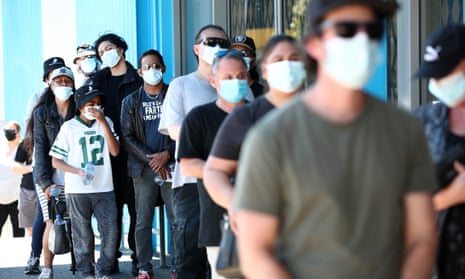New Zealand officials are searching for a Covid-positive escapee, who allegedly absconded from quarantine after being allowed home to check in on a pet.
The person had requested to return home to retrieve personal items, care for a pet and lock their house in south-east Auckland, said Rose King, joint head of managed isolation and quarantine (MIQ). “A security escort was set up to allow this to occur. They were given 10 minutes to do what they needed to. At the 10 minutes mark the security detail went to retrieve them and found the individual had disappeared from the address.”
The escapee is one of three who allegedly attempted to flee quarantine on Tuesday night. Escaping quarantine is an offence under the Public Health Response Act 2020, and can carry penalties of up to a $4,000 fine or up to six months in prison. Authorities said that in an unrelated incident, two failed houdinis were apprehended about five minutes after they escaped.
“They were observed by police and MIQ security the entire time,” King said. She said while there was a low risk that the men had spread Covid-19 on their fleeting bolt for freedom, “these incidents are really disappointing and unacceptable to me”.
Earlier today, New Zealand upped estimates for the spread of the current Delta outbreak, with Covid-19 minister Chris Hipkins saying daily case counts could reach the “high hundreds”.
With its current outbreak passing 2150, the country’s isolation facilities have been filling up. On Tuesday, health officials reported 94 community cases, the country’s highest daily number of the pandemic. On Wednesday, it reported 60. The director general of health, Dr Ashley Bloomfield, said the overall trajectory of cases will keep rising, despite the fall between Tuesday and Wednesday.
Modellers advising the government believe the “R” value - or how many people each individual case infects - is around 1.25, which would see a doubling of cases each fortnight.
New Zealand has avoided the worst of the pandemic, with 28 deaths compared with neighbouring Australia’s 1,448.
However, a significantly less resourced health system – including half of the intensive care beds of Australia, per capita – means New Zealand could endure worse health outcomes with fewer cases.
“We’re likely to see case numbers continue to increase for a period and we do need to be prepared for that,” Hipkins told Radio NZ. “The modellers have different views on where we are likely to top out. It could be as low as 200 or it could be higher than that ... up into the high hundreds.”
There are 180 unlinked cases from the past fortnight. Mr Hipkins denied contact tracers had lost control of the outbreak, but health officials have previously advised tracers would not be able to keep touch with cases should they reach 200 a day.
Epidemiologist and public health prof Michael Baker told the Guardian the number of unlinked cases demonstrated contact tracers were already falling behind.
“The system has started to struggle at under 100 cases – we know that because a few days ago they stopped assigning cases to clusters,” he said.
“It’s going to get rapidly saturated and then problem with that is that it takes away one of the major controllers which is contact tracing … so that will cause the outbreak to accelerate even further.”
While Auckland and much of the Waikato is in lockdown, prime minister Jacinda Ardern is urging vaccination as the key defence.
As of Tuesday, 3.58 million Kiwis are at least partially vaccinated - or 83% of the eligible (aged 12 and over) population. Almost two-thirds are fully vaccinated.
“We have to find the unvaccinated people before Covid-19 does,” Mr Hipkins said.
“Covid is here. It is in New Zealand ... it will find its way across the country at some point and we want to make sure that people have the opportunity to be vaccinated before that happens.”
Mr Hipkins, also education minister, said the decision whether to reopen primary schools is “one of the things that does keep me awake at night, to be frank”.
“On primary school settings, these will quickly become the highest concentration settings of people who are not vaccinated,” he said.
The government will reveal its school reopening plan later on Wednesday.
